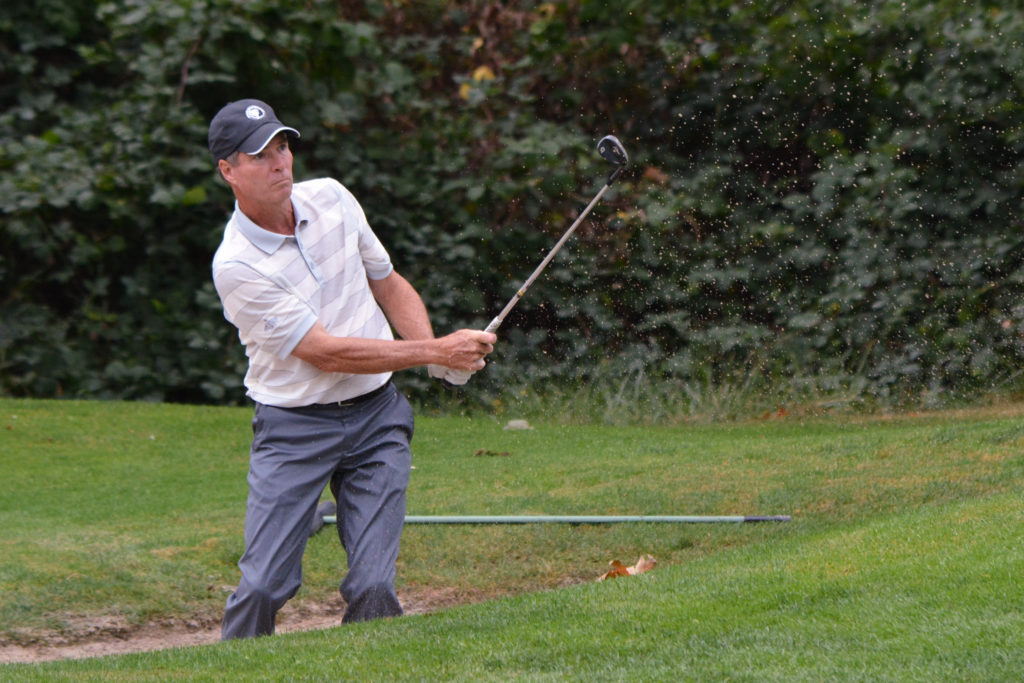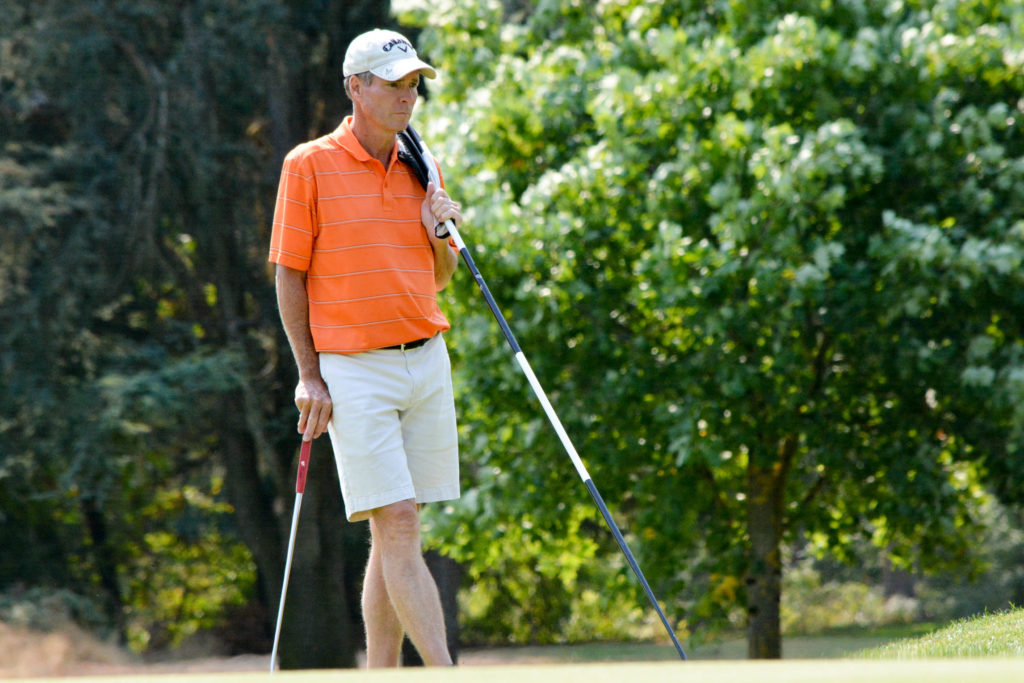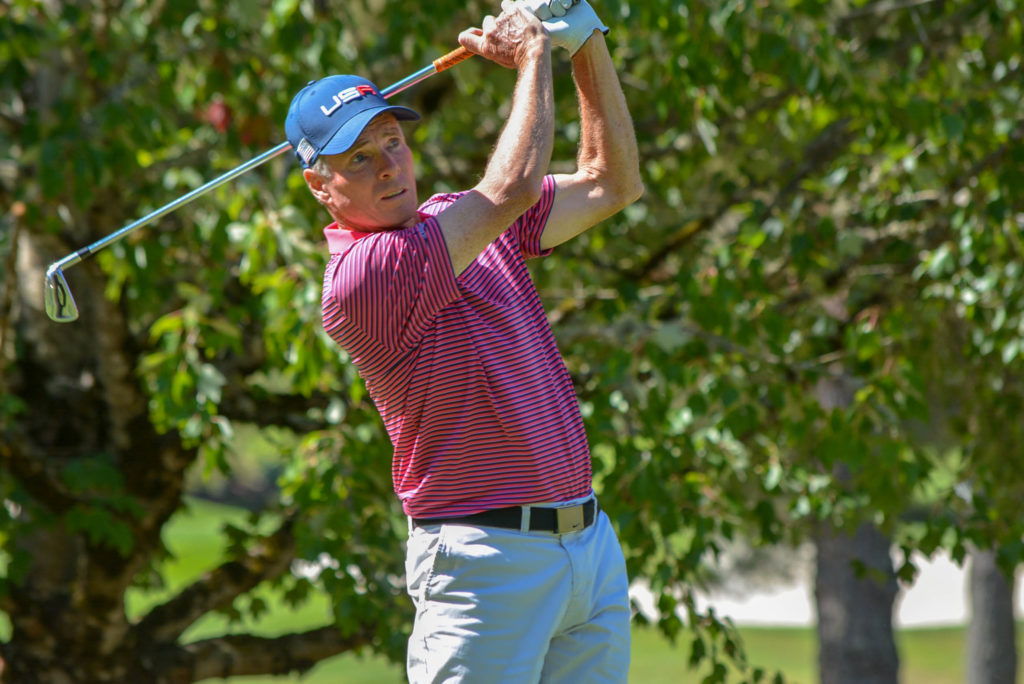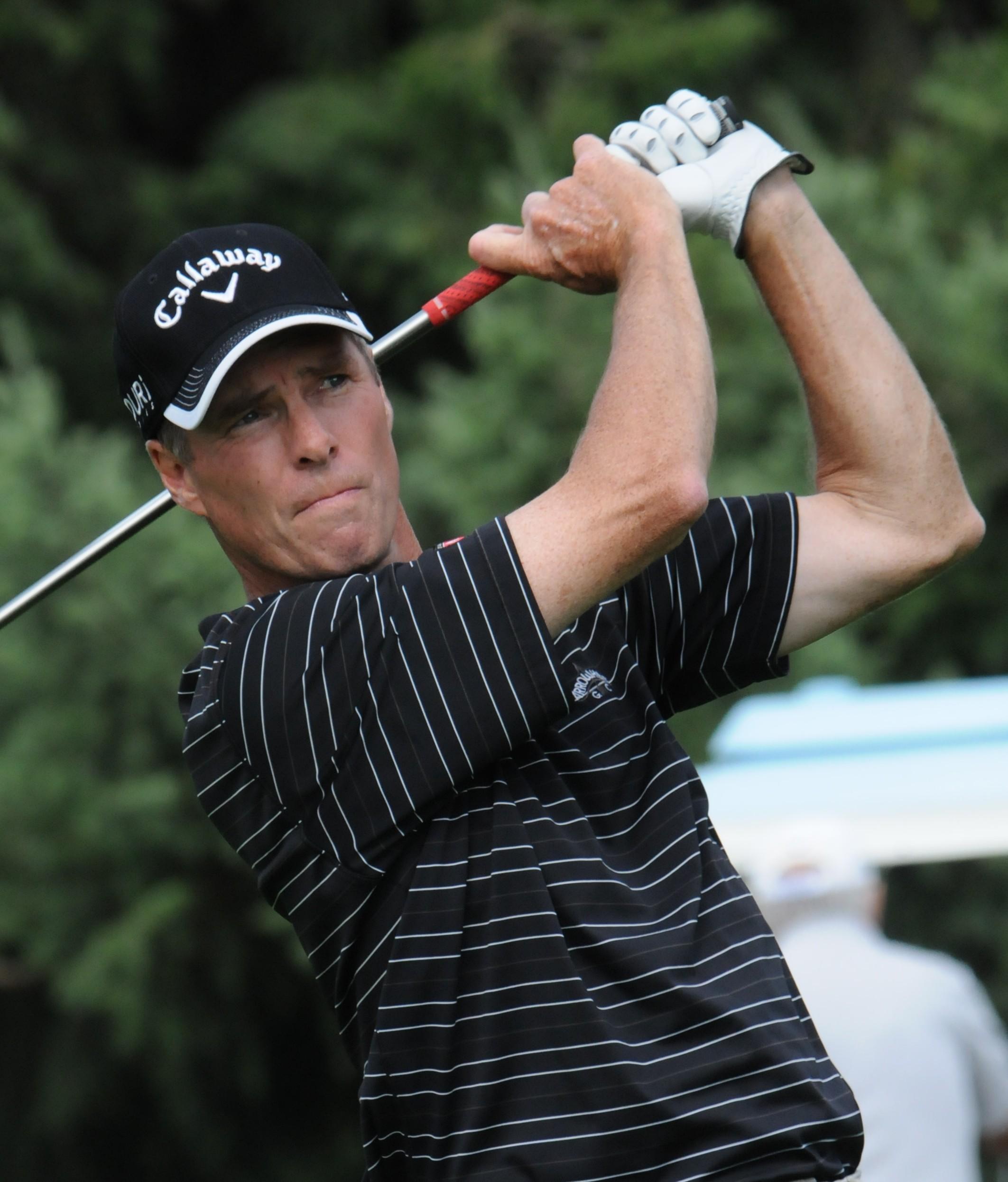Pat O’Donnell: The face of senior amateur golf in Oregon
A “born again golfer” has become a frequent, and exemplary, champion
The face of senior amateur golf in Oregon is a slender, soft-spoken 65-year-old retiree from Happy Valley whose life in the sport has more chapters than a Russian novel.
Now, the story finds Pat O’Donnell a player to be reckoned with, a consistent contender to win, in virtually every tournament he enters.
Were there betting lines for Oregon Golf Association events, such as the pending Oregon Men’s Stroke Play Championship, Aug. 2-4 at Eagle Crest Resort’s Ridge Course, O’Donnell would be the odds-on favorite, given that he’s won the senior division (50 and older) nine times, including the last four.
Not that he expects to win, though much of the rest of the field might predict that.
“I think we’re all competitors,” he said. “You want to play against the best fields. It’s why I never approach tournaments with something like ‘I know I’m going to win this.’ I never approach it that way.
“I always feel that I have to earn it and that anybody out here can beat me.”
Well, maybe not quite anybody. Chris Maletis, a multi-times champion in Oregon amateur golf, ended O’Donnell’s run of four straight wins in the senior Stroke Play in 2011. Randy Mahar, whose credentials include wins in the Oregon Amateur, Oregon Mid-Amateur and Oregon Senior Amateur, won in 2013 and 2014. But you get the point.
“I think he’s really inspiring,” said Brent Whittaker, the OGA’s director of tournament operations who has handed O’Donnell more trophies than he can remember.
“I think that what he’s done is really inspire a lot of senior players to come out and compete. I mean, they look at him and know he’s going to win, but they’re just drawn to it. And it’s forced a lot of our senior players to get better and try to get better.
“We in the Northwest are pretty blessed with a lot of really good senior amateur players, and Pat is certainly at the top of that list. And he continues to push people to get better and that’s what he’s meant to our organization.”
Consider just a few of O’Donnell’s accomplishments and accolades:
* He’s been OGA player of the year three times, including last year, and the Pacific Northwest Golf Association’s player of the year twice.
* He’s won the OGA Senior Amateur six times, including this year. This year he’s also won the OGA Super Seniors, the senior division of the Tournament of Champions and the PNGA Senior Amateur. And, he finished tied for first in a field of younger golfers, both amateurs and professionals, in the Oregon Open before losing in a five-way playoff.
* He’s played in the USGA Senior Open twice, and the U.S. Senior Amateur eight times, including 2013 when he reached the championship match and was the national runner-up. (He failed to qualify this year, for just the second time in the last eight years, shooting a 1-over 73 in the July 23 qualifier at the OGA Course in Woodburn to finish seventh. The two qualifiers, Greg Sanders of Anchorage and Bradley Karns of Vancouver, Wash., shot 66 and 68 respectively.)
* He’s made eight straight Hudson Cup teams, from 2012 through last year and has been a member of the Oregon team for the PNGA Cup 11 times, including this year.
Beyond winning All That, and more, Pat O’Donnell is considered in amateur golf circles to be Alright. And more.
“One of the things that characterizes him is that he’s just the nicest person,” Whittaker said. “He always makes sure he says thank you to all the volunteers and the staff and the staff at the golf course. He always seems really positive. I think that’s an amazing part of his character that he’s positive all the time.
“He’s someone we can point to as a champion, someone we’re really proud of, someone who exemplifies the standards we expect of amateur players. The way he carries himself, his mannerisms, the way he plays the game is one thing we’re proud of.”

Tom Brandes, the PNGA Hall of Famer who is to amateur golf in Washington what O’Donnell is to golf in Oregon, has become a good friend, playing both against O’Donnell in tournaments and as a teammate in events such as the Hudson Cup, in which amateur golfers from Oregon and Washington compete for berths against club pros in a Ryder Cup-style tournament.
“We play against each other all year hoping to make the Hudson Cup team, and then when you make the Hudson Cup team you’ve got him for a partner,” Brandes said. “So I’ve played against him and I’ve played with him and I look forward to both.
“He’s a great competitor and he’s just a really good guy, and as a partner it’s the same. I’ll take him either way.”
In fact, so exemplary is O’Donnell as a champion, competitor and gentleman that golfers who have only met him in his current state are stunned to hear that back in his younger days, this guy could toss a club with the best of them.
But, we’re getting ahead of ourselves; the incarnations of Pat O’Donnell’s life as a golfer are best appreciated from the beginning, when he started playing at age 10 at Columbia Edgewater Country Club in Portland.
He caddied for his dad on weekends. “I switched over to the other guys in his group because they would pay me $5 a loop, when Dad only bought me lunch,” O’Donnell recalled. “It was a business decision.”
His father, Tom, played to an 11 handicap, and if teen-age Pat had a temper, he came by that honestly, having seen his dad vent his frustration on whatever offending club happened to be in hand. “I learned how to repair golf clubs because of him,” he recalled.
During summers, O’Donnell got dropped off the club several times a week for long days of playing. “The Pro Shop finally got so tired of me hanging around that Bunny Mason put me to work cleaning clubs, running carts and picking up range balls,” he said.
He played junior golf against kids from other clubs, including David and Peter Jacobsen, and played four years of varsity golf at Grant High School during which he won a Metro League title. In 1972, the year he graduated from high school, O’Donnell qualified for the U.S. Amateur tournament. On that day, he was paired with Peter Jacobsen, and finished ahead of both Jacobsen and Bob Gilder.
But, he said, “I wasn’t much of a student,” and didn’t attract much recruiting interest. After playing two years at Mount Hood Community College he turned pro, working for Jerry Mowlds at Columbia Edgewater and competing in Monday pro-ams, winning some, and in local tournaments when he could.
It was a short-lived career. His biggest tournament check was $1,900 “and change” for a top-five finish in the Payless Golf Classic. He took on golf club repairs to earn extra money, but after three-and-a-half years, O’Donnell said he realized that the golf business was not going to support a family. He applied to regain his amateur status and in 1978 he went to work at Boeing’s plant in Portland, where he would hold a variety of positions, including shop floor coordinator, production scheduler and maintenance analyst, over the next 37 years.
During the next two decades “life happened.” Golf wasn’t the center of that life.
Sure, he ran the golf league at the Boeing plant, and played in that, nine-hole weekly rounds, and played some Saturday morning rounds at Broadmoor Golf Course, so it wasn’t like he never touched a club. He had some wins in the early 1980s, including the Royal Oaks Invitational open division and the Tournament of Champions open division.
But he was married and had two daughters; his sporting passion in those days was highly competitive slow-pitch softball and modified fast-pitch as a third baseman and later an outfielder, from 1979 through 2002.
O’Donnell went through a divorce, in 1996 after 20 years of marriage, and he took another hiatus from golf for about seven years. By then, he was remarried, to Sue, whom he met on a blind date in 2000 — “my life got better in 2000,” he said. In 2003, as he was approaching his 50th birthday, the line of demarcation for seniors golf in Oregon, he saw the scores that were winning senior events and thought he could compete.
He looked up a golf teacher from his Columbia Edgewater days, Keith Sanden, who was working at a driving range in Beaverton. The remnants of O’Donnell’s swing were still there, but his grip had subtly changed, after years of playing softball, and he was still using relatively ancient equipment, Wilson Staff FG-17 irons dating to 1976, and a bubble-shafted Taylor-Made driver.
Sanden altered his set-up to make his swing more compact and put O’Donnell into new clubs — Titleist irons and woods — that were a half-inch longer, and 2-degrees upright. (He went through a couple of sets of Titleists, and now plays Callaway through the bag, at the same configuration.) The 6-footer saw immediate improvement, though his game had more fine-tuning ahead over the next few years, as he dropped from about a 5 handicap to what is now better than scratch.
He started winning OGA titles in 2007, and qualified for the first of his USGA Senior Ams (the age cutoff is 55) in 2008. He didn’t drive the ball as far as the younger Pat did, but had a solid all-around game.
“I hit the ball longer when I was younger, but I had a weaker wedge game and I was an average putter,” he said. “I have to work on all of it to keep it pretty sharp. I drive it much straighter but not as far. My driving is probably my strongest point.”
His nemesis has been putting.
“That’s what new putters are for,” he quipped, noting that he owns 25 to 30. “I’m a pro shop’s dream.”
Said Brandes, who’s used the same putter forever: “He’ll show up with quite a few different putters, and ‘this one is working and this one is in the doghouse,’ and we kind of laugh about that.”
But this year O’Donnell has worked specifically on putting with John Cassidy, lead teaching pro at Arrowhead Golf Club in Molalla, and taken bunker lessons to stay current with the latest approaches.

O’Donnell practices diligently and plays at least three times a week , walking the course, and he’s blessed with a natural fitness and youthful appearance. (Opponents in a tournament in Canada once questioned whether he met the age minimum of 55; he was 59 at the time.)
“A genetic freak,” said Denny Taylor, his regular playing partner at Arrowhead, who noted that O’Donnell’s breakfast when he worked pre-dawn shifts at Boeing consisted of a couple of donuts and a Mountain Dew.
“Most of us (eating like that) would weigh 300 pounds and not be able to swing a club,” Taylor said. O’Donnell, who neither drinks alcohol nor smokes, has cut out the donuts, but still likes a Dew; he weighed 182 pounds when he retired from Boeing in 2015, weighs 164 now and is considering cycling to maintain fitness as he gets older.
Taylor, a retired salesman and a scratch golfer who played baseball at Linfield and who has himself won the OGA Senior Stroke Play title, in 2002, said the two push each other.
“If I shoot 68, Pat shoots 67,” Taylor said. “We throw it down all the time. I’ll shoot 74, and he shoots 72. … We make each other better, no doubt. We’re very competitive playing each other. I think we drive each other a little bit.
“He’ll grind. He’s a guy who is very difficult to get a read on on the golf course. If you think you’ve got him, you’d better be careful, because he will get you.”
Taylor’s played enough rounds with O’Donnell to know when he’s displeased with a shot. “He’ll have some body language that indicates he was not happy with his shot,” Taylor said. “But unlike some other people who get down after they’ve hit a bad shot, the next shot he hits might be the best shot he’s hit all day.”
Casual observers who watch O’Donnell play in tournaments note his poise, and O’Donnell found, when he began playing as a senior after turning 50, that the hot-headed, club-throwing player from the past had grown up.
“I’m a lot better than I used to be,” he said. “Maturity. Life changes you. Certain things aren’t quite as important. Sure I hit a bad shot and I can still get a little hot under the collar, but it’s changed a lot. And I think that’s what’s helped me. My mental part of the game is much better. It’s a big key. …
“It’s not that I’m trying to be a role model. But I have a lot of people who have watched me play say things like ‘I watched you play and I noticed you didn’t get upset over that missed putt or that shot.’
“I think that’s just being mature. A little age. I mean, I still like to win. I think that’s my biggest drive. And I never go in with confidence, I’m never over-confident in my abilities, but I have a certain amount of expectations. You always like to do good.”
Speaking of “a little age,” O’Donnell shot his two years ago, at 63.
For O’Donnell special memories include that 2013 U.S. Senior Amateur, at Wade Hampton Golf Club in Cashiers, N.C. Rain forced the semis and championship round into the same day; O’Donnell’s caddie, as for virtually all his USGA events, was good friend Craig Plummer, a physiotherapist who had been a classmate at Mount Hood. Sue was in the gallery.
O’Donnell beat a nationally known amateur, Buzz Fly of Memphis, Tenn. 2 and 1, in the semis to reach the final, in which he lost 3 and 2 to the medalist, Doug Hanzel of Savannah, Ga., who had ousted him the year before in the quarterfinals and who played a sensational round.
“You dream about doing it, but you don’t think you can go that far,” O’Donnell said that day. “It was a lot of fun. It was quite a thrill. I felt comfortable out there.”
Another USGA Senior Amateur memory came in 2015, when O’Donnell was unable to reach match play, but returned Hidden Creek Golf Club in New Jersey to caddie for his good friend Brandes, facing prominent East Coast amateur Chip Lutz in the championship match.
Brandes lost, 5 and 3, but remembers the day as special.
“It was a David and Goliath thing and I’m glad I had Pat,” Brandes said. “I didn’t win the match, I didn’t have my A game, but it was really, really helpful to have a friend along for the experience.”
For O’Donnell, what goals are left?
“I told somebody once that if it all happened tomorrow that I couldn’t play anymore I’d be alright,” he said. “I accomplished more than I ever thought of doing. It’s like I’m almost a born-again golfer. …
“I just want to keep playing good. If the wins come, great. That would be nice.”
A version this story was originally posted on oga.org in July 2019.

